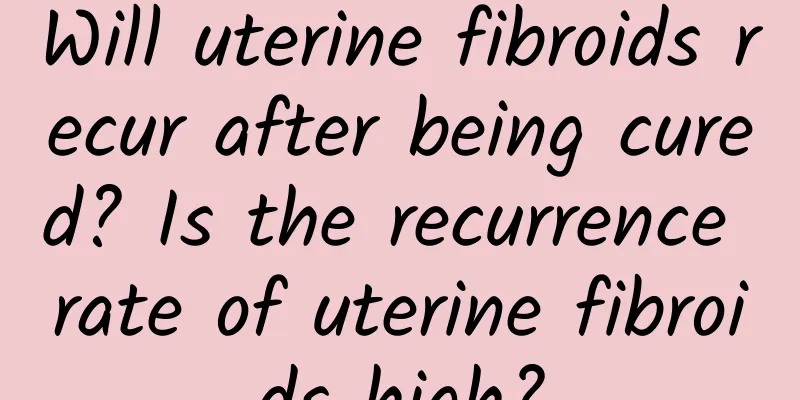Will uterine fibroids recur after being cured? Is the recurrence rate of uterine fibroids high?

|
Many patients with uterine fibroids will ask: Will uterine fibroids recur after treatment? In fact, whether it is open surgery, laparoscopic surgery or ultrasonic ablation, patients with uterine fibroids are likely to relapse, just like a cold. If this cold is cured, they may catch a cold again next time. So how can we effectively prevent the recurrence of fibroids? We can prevent recurrence by maintaining a good attitude, healthy living habits, and proper exercise every day, which can effectively reduce the possibility of recurrence. In addition, uterine fibroids are more common in women of childbearing age, and there are many women with uterine fibroids, but not every woman with uterine fibroids needs surgery. The size of the fibroids is not the only criterion for evaluating whether surgical treatment is needed. Whether there are symptoms, the patient's psychological burden, and whether there are fertility requirements all need to be comprehensively evaluated. If the fibroids are small, there are no symptoms, and there are no fertility requirements, you don't have to rush to have surgery. After all, whether it is minimally invasive surgery or laparotomy, it will more or less cause harm to the body. If the patient can coexist peacefully with the fibroids through self-regulation and control its growth, it is best not to have surgical treatment. Uterine fibroids are benign and generally do not worsen. If the patient's psychological burden is really heavy, surgery can be performed earlier. Otherwise, long-term anxiety will accelerate the growth of fibroids. At the same time, long-term anxiety will reduce the body's resistance and endocrine disorders. Therefore, comprehensive considerations can also be taken to perform surgery earlier. If surgical treatment is indeed needed, the patient can consider non-invasive, non-surgical, and non-bleeding ultrasound ablation treatment. Patients with uterine fibroids should have a general understanding of fibroids, and then decide whether they need surgical treatment and which surgical treatment to choose. In fact, many women have uterine fibroids during their childbearing period. When they first discovered it, they were more worried and scared. This is mainly due to the patient's lack of understanding of fibroids. After having a basic understanding of uterine fibroids, there will not be such a great psychological burden. |
Recommend
Common symptoms of irregular menstruation
Irregular menstruation is the most familiar pheno...
What medicine should I take for endometritis and pelvic inflammatory disease
The treatment of endometritis and pelvic inflamma...
Can early endometrial thickening be cured?
If we can be more careful in our daily lives and ...
The symptoms of chronic cervicitis can be divided into three categories
Cervicitis can be divided into chronic cervicitis...
How much does it cost to treat functional uterine bleeding?
How much does it cost to treat functional uterine...
How to eat to lose weight? Nutritionists recommend that a reduced-sugar diet plus dietary fiber is the key, and eating right will get you twice the result with half the effort!
From the end of the year to the beginning of the ...
What are the key points to prevent menopause?
We all know that menopause can cause great harm t...
What is the reason for heavy menstrual flow?
Excessive menstrual flow is really troublesome. I...
Plastic surgery before development: unpredictable sequelae
According to the Chosun Ilbo, influenced by newsp...
What to do if pelvic inflammatory disease recurs
Pelvic inflammatory disease is a terrible nightma...
Treatment of functional uterine bleeding and metrorrhagia
Functional uterine bleeding is a common disease i...
Why do women have cervical erosion? Four major reasons cause cervical erosion
Cervical erosion is a common gynecological diseas...
What causes uterine fibroids? Can an unreasonable diet also cause uterine fibroids?
1. Bad lifestyle Unhealthy female lifestyles can ...
Choose the best treatment for vaginitis according to your condition
The occurrence of vaginitis has a great impact on...
What causes vaginal blood clots?
Vaginal blood clots are usually normal menstruati...









